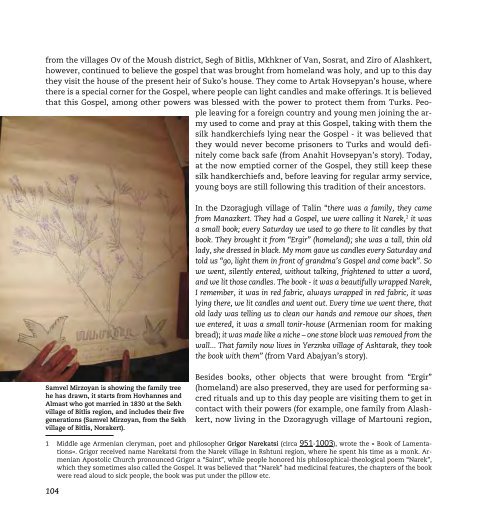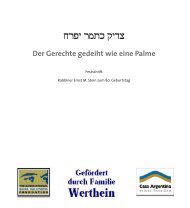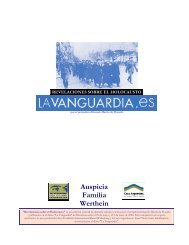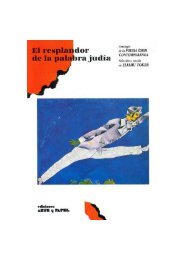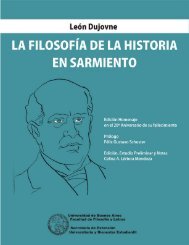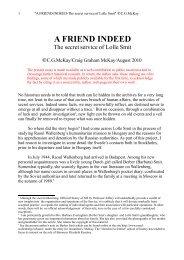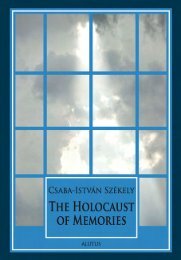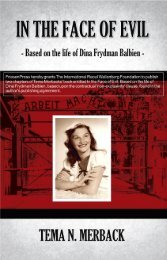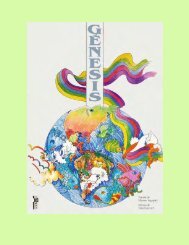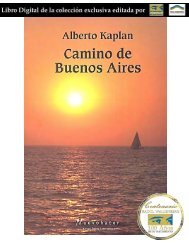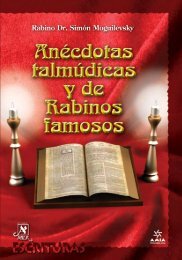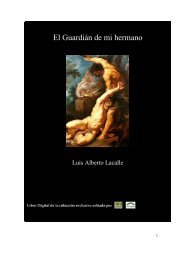Speaking to One Another - The International Raoul Wallenberg ...
Speaking to One Another - The International Raoul Wallenberg ...
Speaking to One Another - The International Raoul Wallenberg ...
- No tags were found...
Create successful ePaper yourself
Turn your PDF publications into a flip-book with our unique Google optimized e-Paper software.
from the villages Ov of the Moush district, Segh of Bitlis, Mkhkner of Van, Sosrat, and Ziro of Alashkert,however, continued <strong>to</strong> believe the gospel that was brought from homeland was holy, and up <strong>to</strong> this daythey visit the house of the present heir of Suko’s house. <strong>The</strong>y come <strong>to</strong> Artak Hovsepyan’s house, wherethere is a special corner for the Gospel, where people can light candles and make offerings. It is believedthat this Gospel, among other powers was blessed with the power <strong>to</strong> protect them from Turks. Peopleleaving for a foreign country and young men joining the armyused <strong>to</strong> come and pray at this Gospel, taking with them thesilk handkerchiefs lying near the Gospel - it was believed thatthey would never become prisoners <strong>to</strong> Turks and would definitelycome back safe (from Anahit Hovsepyan’s s<strong>to</strong>ry). Today,at the now emptied corner of the Gospel, they still keep thesesilk handkerchiefs and, before leaving for regular army service,young boys are still following this tradition of their ances<strong>to</strong>rs.In the Dzoragjugh village of Talin “there was a family, they camefrom Manazkert. <strong>The</strong>y had a Gospel, we were calling it Narek, 1 it wasa small book; every Saturday we used <strong>to</strong> go there <strong>to</strong> lit candles by thatbook. <strong>The</strong>y brought it from “Ergir” (homeland); she was a tall, thin oldlady, she dressed in black. My mom gave us candles every Saturday and<strong>to</strong>ld us “go, light them in front of grandma’s Gospel and come back”. Sowe went, silently entered, without talking, frightened <strong>to</strong> utter a word,and we lit those candles. <strong>The</strong> book - it was a beautifully wrapped Narek,I remember, it was in red fabric, always wrapped in red fabric, it waslying there, we lit candles and went out. Every time we went there, tha<strong>to</strong>ld lady was telling us <strong>to</strong> clean our hands and remove our shoes, thenwe entered, it was a small <strong>to</strong>nir-house (Armenian room for makingbread); it was made like a niche – one s<strong>to</strong>ne block was removed from thewall... That family now lives in Yerznka village of Ashtarak, they <strong>to</strong>okthe book with them” (from Vard Abajyan’s s<strong>to</strong>ry).Samvel Mirzoyan is showing the family treehe has drawn, it starts from Hovhannes andAlmast who got married in 1830 at the Sekhvillage of Bitlis region, and includes their fivegenerations (Samvel Mirzoyan, from the Sekhvillage of Bitlis, Norakert).Besides books, other objects that were brought from “Ergir”(homeland) are also preserved, they are used for performing sacredrituals and up <strong>to</strong> this day people are visiting them <strong>to</strong> get incontact with their powers (for example, one family from Alashkert,now living in the Dzoragyugh village of Mar<strong>to</strong>uni region,1 Middle age Armenian cleryman, poet and philosopher Grigor Narekatsi (circa 951-1003), wrote the « Book of Lamentations».Grigor received name Narekatsi from the Narek village in Rshtuni region, where he spent his time as a monk. ArmenianApos<strong>to</strong>lic Church pronounced Grigor a “Saint”, while people honored his philosophical-theological poem “Narek”,which they sometimes also called the Gospel. It was believed that “Narek” had medicinal features, the chapters of the bookwere read aloud <strong>to</strong> sick people, the book was put under the pillow etc.104


